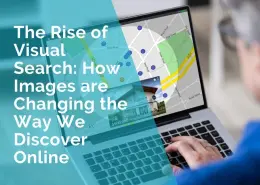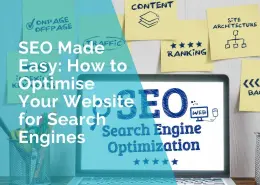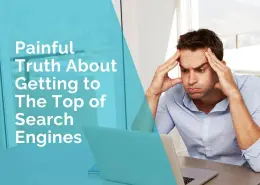How Search Works
In an easy to understand video “How Search Works” Matt Cutts, Google Quality Engineer explains how Google indexes pages and then delivers results when someone does a search. The main point Matt makes is that Google asks over 200 questions of each page and then delivers pages that are most relevant.
When deciding which pages to show for each search term, some of the questions Google asks include:
Do the search words appear in the title?
Do they appear in the URL (website address)?
Does the page include synonyms for those keywords?
Is the page from a good quality website or low quality?
What is the page’s “Page Rank”?
How many pages link to this page?
Then Google combines all the answers, gives each page a score and delivers the results, which it feels is the most appropriate to what the visitor is searching for.
Whilst Google is not the only search engine, it is by far the most popular one, with over 90% market share!
What is also worth noting is that 49% of all searches are performed on mobile devices.
What this means is that you should focus your optimization efforts to what Google is looking for and you should not only optimize your website for desktops and laptops, but also for mobile devices.
1. Keyword Research
Search Engine Optimization Begins with Keywords
There are a number of aspects to search engine optimization but one of the most important ones is keyword research and use.
Whilst using the exact key phrases that a person would use to search was critical in the past, that is no longer the case. Rather, Google now looks at the intent behind the search, ie. what problem did the searcher intend to solve.
But how do you know what problems your potential customer needs solving?
If you’ve been in business for a while you may have some idea, although you may be surprised by all the potential questions your customers have and need answered before they hire you or buy your products.
To find out what your potential customers really want to know, you can ask them by email or on social media, but if you are just starting out in business and don’t have any clients yet, check out Answer the Public – https://answerthepublic.com/
Simply type in a subject or keywords and you will be presented with all the questions people have entered into search engines on that topic.
For example, if you type in “Search Engine Optimisation”, you will see hundreds of searches people have entered, such as:
- Where to learn search engine optimization
- How does search engine optimization work
- Search engine optimization does it work
- Search engine optimization classes near me
- Search engine optimization for beginners
- Search engine optimization in simple terms
- Why is search engine optimization important
- Is search engine optimization free

As well as search terms, the tool shows you comparisons that people have searched. For example:
- Search engine optimization vs pay per click
- Search engine optimization or organic
- Search engine optimization and benefits
And finally, it provides you with the search terms in alphabetical order, so you can see everything that people have searched.
For example under “Search Engine Optimisation D”, the tool shows the following results:
- search engine optimisation definition
- search engine optimisation define
- search engine optimisation digital marketing
- search engine optimisation disadvantages
- search engine optimisation description
- search engine optimisation diy
- search engine optimisation degree
- search engine optimisation def
- search engine optimisation details
- search engine optimisation duplicate content
- search engine optimisation domain
- search engine optimization definition
- search engine optimization define
- search engine optimization digital marketing
- search engine optimization description
- search engine optimization diy
- search engine optimization definition wikipedia
- search engine optimization disadvantages
- search engine optimization degree
How To Research Keywords
Your first priority should be to find keywords which have a reasonable amount of searches each month, but for which not a lot of other websites have been optimised.
Generally it’s not a good idea to optimise your website for generic keywords, such as “travel” or “cars”. You want to optimise your website for keywords that people are searching, when they are ready to buy, not for keywords they are using for research.
Keyword Research Tools
There are several great tools you can use for this:
– Google Adwords Keyword Suggestion Tool (free)
– Uber Suggest (free)
– AHrefs (paid)
– SEMRush (paid)
Each works slightly differently, but each will give you an idea on the right keywords to use.
Step 1 – List relevant topics
The first step in your research should be to make a list of relevant topics for your business. For example if you’re a business coach, your topics may be:
- Business Coaching
- Business Start up
- Website Design
- Business Marketing
- Marketing Automation
- Business Systems
These keywords are very broad and there is a lot of competition, so ranking well in search engines may be difficult
Step 2 – Narrow each topic to more specific key phrases
Now it’s time to narrow these to more specific key phrases. Let’s take “Website Design” as an example.
Brainstorm ideas of what potential clients may be searching for such as:
- Website design software
- Website design course
- Website design templates
- Website design ideas for business
- Website design tips
- Website content
These terms are more focused, but in most cases still very competitive.
Step 3 – Get specific keyphrases for your posts and articles
Your final step is to get very specific and find key phrases that you can write about on your web pages or in your blog posts.
The best tool for that is Google Related Search.
Let’s take “Website Design Course” as an example. Enter this into Google and you will see a list of suggested terms
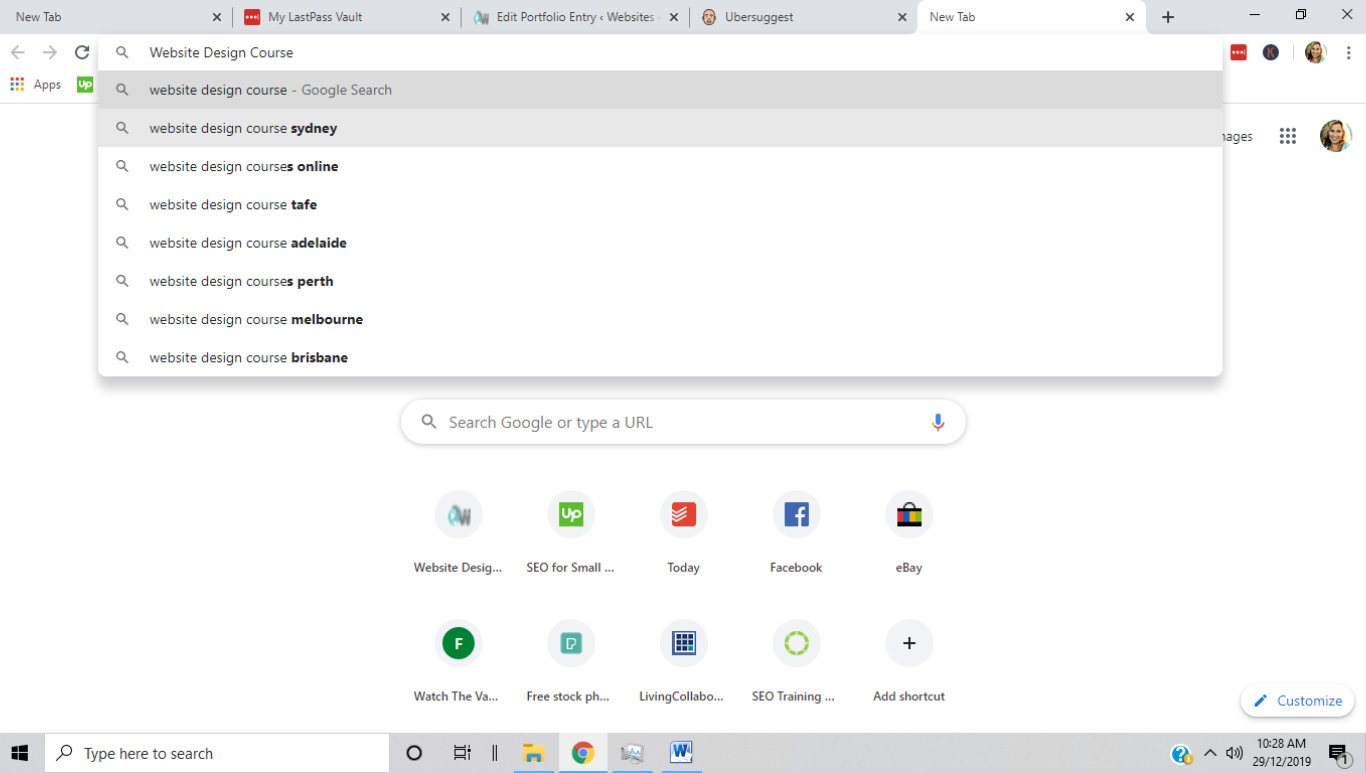
When you have a list of specific keyphrases, it’s time to add them to your website.
It is important that you do not overstuff your content with the keyword or you may be penalized by Google.
An example of keyword stuffing for “Sydney Wedding Photographer” would be:
Sydney Wedding Photographer Sam Jones is an award winning Sydney Wedding Photographer. If you need a Sydney Wedding Photographer, contact Sam.
Where to Include Your Keywords
Once you have found the most appropriate keywords and keyphrases, it’s time to include them on your website:
1. Your website domain name or at least as part of your URL
If possible include your keywords as part of your domain name, however, if you have already registered your domain name then try to include your primary keywords for each page in their file name.
For example, if you are an electrician and your domain name is AffordableElectrician.com.au, you could create pages such as
affordableelectrician.com.au/emergency-electrical-services
affordableelectrician.com.au/powerpoints
affordableelectrician.com.au/fault-finding
On the other hand if you are a business coach trading under your name, you could create pages such as:
kathytaylor.com/business-coaching
kathytaylor.com/small-business-coaching
I have seen people register dozens of domain names, thinking that if they point them to their website, they will rank higher. This is simply not true.
As mentioned earlier, Google looks at over 200 elements before it ranks a page and whilst a good domain name, with the right keywords helps, having 20 similar domain names will not.
The reason for doing this is that the URL is the first thing the search engines see and so by including your primary keywords in your URL you tell the search engines exactly what your web page is about.
2. Within the content of your website
Ideally, you should create a separate page for each keyword or keyphrase.
Once you have created the page, include the keywords in the:
- Title – after the URL, your page title is the next thing visible to the search engines and helps to reinforce what your website is about. This applies to both your on-page title as well as the meta title.
- Headings of your pages, ie between the H1, H2, H3, H4 tags
- Page meta description
- Alt tags of your images.
- Your keywords/keyphrase should also be featured in bold somewhere near the top of your page, preferably in the first paragraph.
- Content of the page.
2. On Page Optimisation
Content Writing for SEO
Once upon a time, writing lots of shorter blog posts on the same topic would help your ranking. However, that is no longer the case.
Google now gives priority to websites that provide in-depth information on a particular topic. This is referred to as content marketing. A major part of this strategy involves focusing on on-page SEO optimization, ensuring that every piece of content is well-structured and relevant
Much has been written on the topic, but the general idea is that you:
- Create a Pillar Post (also referred to as Cornerstone page). A pillar post should be over 3000 words in length and link to response posts.
- Write a number of response posts, which are at least 1600 words. Each response post should concentrate on one topic only.
- Place a link from the pillar post to all relevant response posts and vice versa.
- Each post title (which includes your keyphrase) should also be featured on your page in the H1 tags.
- Divide each post with H2 tags and every H2 tag with H3 tag
- Your first paragraph needs to summarise the main subject of the article and you should bold the keyphrase.
- Other than linking to your response post, include links to authority websites, where possible.
Google prefers these clusters of relevant information and will generally rank you higher, as it perceives you to be an authority on a particular subject.
For an example of a pillar post, go to “Website Design Checklist”
Learn the what, how and why of content promotion.
Tools for Creating Content
Creating high-quality content can be time-consuming, but there are a number of tools available to help you streamline the process. Here are a few resources that can be valuable for content creators:
1. Paragraph generator
This AI paragraph creator automatically generates quality paragraphs on a given topic. It offers new ideas to help overcome writer’s block. This tool saves writers valuable time and effort.
2. Jasper
Jasper (formerly known as Jarvis) is an AI writing assistant designed for marketing content. It can help create blog posts, social media content, ad copy, and more. Jasper uses GPT-3 technology and can be trained on your brand voice.
3. ChatGPT
Developed by OpenAI, ChatGPT is a large language model that can engage in conversational interactions. It can assist with writing, answer questions, and help brainstorm ideas. While not specifically designed for content creation, many use it to generate drafts or get writing suggestions.
4. Gemini
Gemini is Google’s large language model, similar to ChatGPT. It can assist with various tasks including content creation, answering questions, and providing information on a wide range of topics.
5. Paraphrasingtool.us
This is an online tool designed to rephrase existing text. It can be useful for avoiding plagiarism, improving readability, or generating alternative ways to express ideas. However, it’s important to review and edit the output for accuracy and coherence.
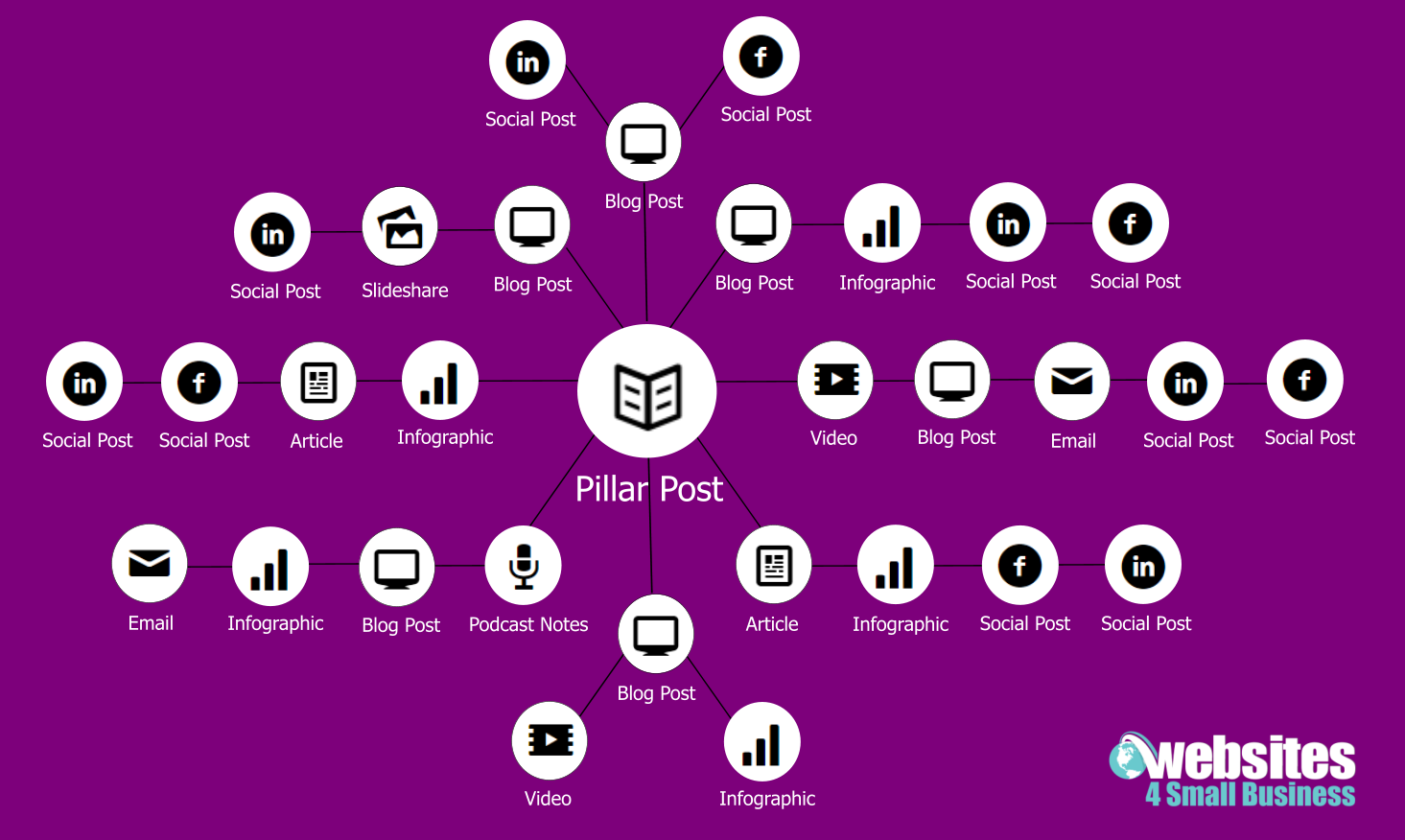
Technical Optimization
In addition to keywords and link building for search engine optimization there is also the aspect of technical optimization. This means ensuring that your website is properly designed and structured.
- Text based content
Your website should be easy for the search engine robots to read. If you had to use a text-only browser to view your website you should still be able to see your website properly and the content should still be readable.
Websites that have written content in Flash, graphics, etc or just contain images are not technically optimized and will not rank well.
- No broken links
Check that there are no ‘dead’ links on your website. Use this Online broken link checker
- Valid code
Ensure that the code on your website is well written. You can use a code validator from W3.org to check if your website is correctly coded.
- Your website is mobile responsive
This means that your website adjusts itself automatically when someone is using their mobile phone.
- Use SSL
Ensure your website has SSL (Secure Sockets Layer) certificate. This creates encrypted link between a web server and browser.
You can see if your website has a lock next to your URL – and your URL should start with https:// NOT http://
- Load Speed
Search engines prefer websites that load quickly, so ensure your web page speed is at optimum.
- Duplicate content
Make sure you don’t have the same article or posts published on your website several times.
Sitemaps and Submissions
Once you have created your website using keywords and have ensured that it is technically optimized, another way you can help to improve your search engine optimization results is by using sitemaps and submitting these to Google and other search engines.
This helps to get your website indexed faster and can keep them up to date with what is happening on your website.
SEO Plugins

3. Off Page Optimisation
Link Building for Website SEO
Another important aspect of website SEO is link building. The more pages link to your web page, the better your results will be.
Google sees each link from a relevant website to yours as a vote. The more votes you have, the better.
These should not only be on site links (pages on your website linking to other pages on your site) but you should also approach other relevant businesses and ask them to link back to your website. An email lookup tool can be invaluable for identifying the right contacts to reach out to for these link-building opportunities.
You may have heard the term “backlink” – what this simply means is a one-way incoming link from another business to yours.
It is important, however, that the links coming back to your website are from relevant and reputable businesses. That is to say, if you are a wedding planner, you could have links from
- Marriage celebrants
- Florists
- Photographers
- Wedding venues
- Caterers
It wouldn’t help you if you have a link from your nephew who is a car mechanic.
Getting other businesses to link to you can be time consuming. Here are 101 ways to get quality backlinks
In all honesty, the best way to build backlinks is by providing quality content to which people will link to naturally.
Since link building and your backlink profile play a huge role in your domain authority and your rankings (which translates to ‘traffic’), plus it’s a difficult, tedious, and very time-consuming process, it might be best to hire and utilize a reputable white label blogger outreach service which will help streamline this process. Besides streamlining, they will have the knowledge and the experience to get you high-quality do-follow links that are relevant to your industry.
Google My Business
For local Search Engine Optimisation strategy, claim and verify your Google My Business (GMB) listing.
Getting on Google My Business can increase your chances of showing up in Google’s local searches and Google Maps and it may help with organic rankings in general.
GMB allows you to include information about your company, address, phone number, business hours, and types of payments accepted, photos as well as offers and posts.
According to Google Local results are based primarily on relevance, distance, and prominence.
These factors are combined to help find the best match for your search. For example, Google algorithms might decide that a business that’s farther away from your location is more likely to have what you’re looking for than a business that’s closer, and therefore rank it higher in local results. As such businesses with complete and accurate information are easier to match with the right searches.
Google also suggests you interact with customers by responding to reviews that they leave about your business.
Responding to reviews shows that you value your customers and the feedback that they leave about your business. High-quality, positive reviews from your customers will improve your business’s visibility and increase the likelihood that a potential customer will visit your location. Encourage customers to leave feedback by creating a link they can click to write reviews.
International SEO
On the other hand, if you want to boost your search engine ranking in other countries, check out 6 Ways to Boost Your International SEO Results
Social Media Sharing
Write engaging posts which encourage your social media followers to:
- Like
- Share
- Vote
- Pin
- Comment
Here are some suggestions on what to post:
- Inspirational quote
- Testimonial
- Short video
- Answer a faq
- Offer free download
- Ask a question
- Behind the scenes
- Fun fact
- Customer spotlight
- Industry news
- Quick tip
- Product spotlight
- Just for laughs
- Special Promo/Offer
Check out – 30 day social media sharing calendar.
Learn more about Off Page SEO
SEO is a very complex topic and most small business owners are unsure about how it affects their business. Here are some frequently asked questions about search engine optimization.
Frequently Asked Questions about Search Engine Optimisation
Is SEO important anymore?
Yes absolutely. SEO is as important as it has always been. Although the way people search has changed dramatically over the past few years.
More people are searching using their mobile phones and devices. As such your website needs to be mobile responsive
Where text was once the only way to search for a solution to a problem, more and more people prefer videos, so including videos on your website will make you stand out from your competition since the most entrepreneurs find videos too difficult to produce.
If you yet haven’t set up a “Google My Business” account, now is a great time to do it. This page allows you to control the information Google reports about your business in its search results.
How Much Does SEO Cost?
As you can see Search Engine Optimisation is a complex and time consuming process and takes time to do properly. It’s also important to understand SEO is not a one off exercise …
The cost of SEO services depends on what is included and how competitive the keywords you are trying to rank for are.
You will most likely find great variation in prices, but just as with anything else in life you get what you pay for.
Here is a general guide:
Initial Set up Fee: $500 – $1500
Monthly Charges: $500 – $3000
How Do I Find My Ranking On Google?
There are several ways you can find how you rank in Google.
Simply search Google for your chosen keywords and see if your website comes up on the first page.
Be aware, however, Google is very smart and will show you websites you have visited in the past, so you may find that it shows your website on the first page, but this may only be because you have visited your website often. Your customers may not see your website at the top of Google.
There are several tools you can use to see how your website ranks. These include:
SEM Rush
SEM Rush tracks your site’s positions in Search Results.
You can track your website’s ranking for target keywords
Analyse location specific data
Manage thousands of search terms by grouping keywords with tags
https://www.semrush.com
Moz
MOZ SEO insights help you rank higher and convert more traffic by:
Helping you understand search intent and find traffic driving keyword opportunities.
Allowing you to track how you’re ranking for keywords
Finding quality authoritative links
Google Search Console
This is Google’s own dashboard which features tools and reports that help you measure your site’s search traffic and performance. It also helps you to fix issues, submit sitemaps and individual URLs for crawling.
Google Search Console also sends you alerts whenever Google identifies issues on your site. You can see which URLs are affected and once fixed you can advise Google.
The Console also helps you understand how Google Search sees your pages.
To find out more, go to
https://search.google.com/search-console/about
To see your keywords in Google Search Console:
- Log in
- Click “Performance,” and scroll down the page.
- The “Queries” tab will be selected by default. Below it, you can scroll and page through the list to see every keyword you show up in search results for across your entire website.
Does Social Media Affect SEO?
Much has been written about whether social media activity plays any importance in how your website gets ranked. Whilst there is a lot of conflicting information, according to MOZ, the importance of social signals has increased and will continue to play a greater role in SEO.
In his guide about social signals for SEO Jayson DeMers states “In two years, companies playing in competitive niches that don’t have a robust social strategy will be left in the dust by those that do; Social signals are becoming the new “link” in terms of overall importance in the ranking algorithm.”
https://moz.com/blog/your-guide-to-social-signals-for-seo
According to SEO guru Neil Patel, social media and SEO are in a mututally beneficial relationship.
In his article “Don’t Get Left Behind: 6 SEO Trends That’ll Affect Your Traffic”, Neil discusses the increasing importance of social signals and how they impact domain authority and page authority.
https://neilpatel.com/blog/6-seo-trends-that-will-sustain-your-search-rankings-and-organic-traffic/
And finally, Matt Cutts, Administrator of the United States Digital Services and former head of Google’s web spam team says it best: Social signals may not produce an immediate SEO result, but if you keep at it, they’ll produce results in the long-term.
What are the best SEO tools?
There are many tools available that can help with your SEO efforts. Some of these include
Ahrefs
Ideal for research and analysis. It is one of the largest website crawlers and highlights parts of your website that require improving in order for your website to rank higher
SemRush
Suitable for keyword and competitor research. A favourite in the SEO community – one of its most popular features is the Domain vs Domain analysis which allows you to easily compare your website against your competitors.
MOZ
Offers great insights into how your website is performing and the best way to improve it. This tool is used by many SEO experts
Site Checker
Site Checker is a free tool which allows you to improve your SEO rating by analyzing your On Page information, including your titles, descriptions, H1 – H6 tags, page sizes, URL friendliness, Meta titles and descriptions, Broken links and Website speed – https://sitechecker.pro/
Find more SEO tools
Summary
If done correctly, search engine optimization can greatly enhance the amount of website traffic you get to your website.
Over the years Google’s and other search engines algorithms have changed and whilst the exact formula for delivering results is not known, there are basic principles that you should stick to if you wish to rank highly for your chosen keywords.
- Include your keywords and key phrases in the domain name or URL, in the title, in the description, in headings, meta tags, image alt tags and throughout the content of your web page
- Provide quality, original content and crosslink pages within your website where appropriate
- Update your website regularly with fresh information
- Get quality links from relevant websites back to yours
Be careful of many SEO myths that are being passed around.
Search Engine Optimisation is not a one off exercise … you need to keep working at it. Whilst many people try to trick the search engines, it is never a good idea, as they ultimately end up being dropped from the search engines and even banned.
So the more you do, the more chances you have of your website ranking higher than your competitors.
Search Engine Optimisation is a complex and time consuming process and best left to the experts. Google and other search engines change the way they rank websites regularly, so unless you have good technical knowledge and understanding of the latest SEO trends, it may be difficult for you to rank highly, especially if your business has a lot of competition.
However, if you are keen to tackle SEO yourself, check out The Beginner’s Guide to SEO provided by MOZ –
The guide covers topics such as:
- SEO 101
- How Search Engines Work – Crawling, Indexing and Ranking
- Keyword Research
- On-site Optimization
- Technical SEO
- Link Building & Establishing Authority
- Measuring, Prioritizing and Executing SEO
For a quick reference guide, check out this SEO Made Easy Infographic.
*****
by Ivana Katz
Websites 4 Small Business – www.web4business.com.au;
Ivana makes it easy for you to get your business online very quickly. If you’re looking for a professional and affordable website designer, CLICK HERE and download your FREE copy of “Ultimate Website Design Secrets Blackbook – 10 Bulletproof Strategies for Designing an Outrageously Successful Website”





